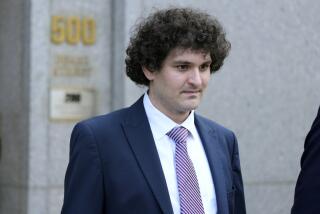Wiles Convicted of Fraud in MiniScribe Case : Computers: Former chairman faces prison, $750,000 fine for role in scam at now-defunct disk drive maker.
- Share via
In what may be the final chapter in the tale of collapsed computer disk drive maker MiniScribe Corp., its former chairman has been convicted on federal fraud and insider trading charges.
Once-renowned turnaround specialist Quentin Thomas (Q.T.) Wiles of Sherman Oaks faces up to 15 years in prison and $750,000 in fines for his role in what was alleged to be a massive fraud on creditors and shareholders of the Longmont, Colo.-based firm.
Wiles’ trial, which ended in a Denver federal court July 29 with guilty verdicts on three felony counts, was the last of several significant legal actions that followed Wiles’ resignation in 1989 from the company he was hired to save.
After he left, MiniScribe’s new management said it uncovered “massive fraud” during Wiles’ regime that included doctoring the company’s books, recording shipments as sales and even packaging and shipping bricks to give the appearance that disk drives were being sold.
Previously, the accounting firm Coopers & Lybrand was ordered by a Denver bankruptcy court to pay $95 million to settle claims filed by MiniScribe’s creditors and shareholders related to the accounting firm’s work for MiniScribe. It was one of the largest legal settlements by an accounting firm in U.S. history.
Wiles and the San Francisco-based Hambrecht & Quist investment banking firm, which has had many high-technology firms as clients, was named in several civil suits resulting from MiniScribe’s failure and was forced to make some settlements.
For example, Hambrecht & Quist settled for an undisclosed sum a Texas suit in which MiniScribe bondholders were awarded $550 million in damages.
Wiles was an executive and roving trouble-shooter for Hambrecht & Quist and had earned the moniker “Dr. Fix-It” after several successes in nurturing high-tech companies back to health.
After he joined troubled MiniScribe in 1985, the company appeared to achieve a remarkable turnaround, with surging sales and profit and a soaring stock price. But Wiles resigned shortly after the company reported a loss for the fourth quarter of 1988.
It was then that the new managers reported to the Securities and Exchange Commission their allegations that inventory numbers were fraudulently boosted to conceal MiniScribe’s financial condition. The company has since been liquidated.
Wiles was convicted of filing with the SEC a false annual report that overstated MiniScribe’s 1987 profit by about $15 million. Prosectors said the overstated income was the result of “an elaborate scheme” to conceal a $15-million shortfall in inventory.
Wiles knew of the shortfall and sold about $1.7 million of MiniScribe stock in April and May of 1988, before the information was made public, the U.S. attorney’s office said.
The false financial statements were also submitted to Standard Charter Bank as a means to secure a $90-million loan for MiniScribe, prosecutors said. Standard Charter suffered significant losses from the loan, they said, although the bank recouped most of the losses in a civil settlement.
Wiles’ attorneys maintained that Wiles knew nothing of the wrongdoing and that he had been duped by his underlings at MiniScribe. Several former MiniScribe employees who were promised immunity from prosecution testified against Wiles. It has been reported that Wiles’ attorney, H. Alan Dill, is likely to file an appeal.
Wiles is expected to be sentenced in September.
Patrick J. Schleibaum, who was chief financial officer of MiniScribe, was found guilty in June in federal court in Denver of two counts of filing a false statement with the SEC and of insider trading. Schleibaum is also expected to be sentenced in September.







